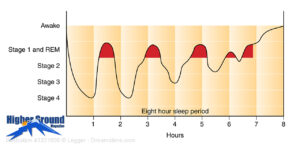Many individuals struggle with sleep for a variety of reasons. Some have full blown insomnia, but others struggle with sleep issues that are more difficult to define. One example is individuals who are able to sleep, but nonetheless wake up unrefreshed every morning. For these individuals, the issue is often an inability to properly cycle through all stages of the body’s sleep cycle. Cannabis is able to help with this problem in particular, as well as with sleep disorders like insomnia and sleep issues stemming from other disorders such as Fibromyalgia and Multiple Sclerosis. Regardless of the reason why obtaining optimal sleep is difficult, cannabis may be a safe natural treatment method for a wide range of sleep disorders.

Cannabis is a superb alternative to sleep medications for many reasons. Many medications for insomnia are unsuitable for long term use, cause undesirable side effects such as sleep walking or drowsiness the next day, are addictive in nature, or create chemical dependencies in users.(7) Furthermore, they hold potential for fatal overdoses.(4,7) Cannabis, on the other hand, is void of these risk factors. No fatalities directly from cannabis have been reported to date, and whether or not a person can become chemically addicted is debatable.(4)
Cannabis helps with sleep by activating the endocannabinoid system, which can cause drowsiness. (1) The endocannabinoid system is also at least partially responsible for regulating the brain’s sleep-wake cycle.(5) Studies show cannabis helps those who suffer from insomnia fall asleep faster and decreases sleep interruptions.(2,6) Evidence from recent research supports the idea that cannabis improves sleep in those who suffer from insomnia due to pain related conditions such as fibromyalgia, multiple sclerosis, and cancer.(2) Improvements in sleep have been reported by at least 70 percent of people who use cannabis for medicinal purposes involving sleep disorders.(1)
How Cannabis Affects The Sleep Cycle
As previously mentioned, cannabis interacts with the body’s endocannabinoid system, which is involved in biological functions responsible for naturally regulating sleep wake cycles. Normal, healthy sleep consists of four stages, grouped into two main categories: NREM sleep and REM sleep. NREM sleep is composed of stages one through three of sleep, while REM sleep is composed solely of stage four.
Stage one occurs during the initial 5-10 minutes after an individual drifts off to sleep. It is characterized by a very light state of sleep, one in which a person is likely to feel as if they are still somewhat awake or conscious. Stage one of sleep is so light that often, when awakened during this stage, an individual will adamantly claim that they were not actually asleep at all. They firmly believe or suspect they have been awake and never began drifting off to sleep in the first place.
Next, the processes of stage two of sleep begin setting into motion. An individual’s body temperature drops and their heart rate slows down, as do numerous other functions in the body system as it melts deeper into a state of total relaxation. However, stage two of sleep is still considered and experienced as a relatively light stage of sleep. After approximately 20 minutes in stage two of sleep, the body, when functioning optimally, effortlessly shifts out of stage two sleep and into stage three of sleep.

Stage three of sleep is characterized by a state of deeply relaxing sleep, and is commonly referred to as slow-wave sleep, deep sleep, or delta sleep. During this stage, blood flow to the brain is redirected to the muscles. This prompts brain waves to slow down dramatically, allotting for deeply rejuvenating sleep and total relaxation of the body and mind.
Redirection of blood flow not only allows for proper restorative sleep by relaxing the muscles and diminishing brain and stimulation of the Central Nervous System (CNS), it simultaneously detoxifies the brain and body and restores stamina of the physical body. Thus, when an individual enters all stages of sleep properly, they are able to wake the next morning with ideal levels of mental clarity and well-being, excellent cognitive functioning and clarity, and optimal levels of physical stamina and energy. Stage three of sleep lasts approximately 30 minutes, at which point an individual then enters the fourth stage of sleep, also known as REM sleep.
REM sleep is the longest stage of sleep, and is the state in which dreams occur. Rapid eye movements are a key characteristic of REM sleep, as are an increase in breathing and heart rate. Brain activity is actually increased during REM sleep, making vivid dreams possible. Although a person’s brain activity becomes heightened in stage four of sleep, their limbs remain relaxed and immobile.(3)
Cannabis Helps Individuals Cycle Through All Stages of Sleep Properly
Unfortunately, many who have difficulty sleeping fail to fully progress through all stages of the sleep cycle, a process dire to optimal functioning of the body — and one of the most important factors when striving to heal from any illness and to stay healthy. Cannabis may be the clinical pearl needed to solve this problem, as it increases the amount of time spent in stage three, or slow-wave, sleep.
In doing so, cannabis decreases the amount of time spent in REM sleep, keeping a person from waking drowsy and unalert from staying in REM sleep longer than necessary. According to sleep experts, damaging effects of sleep deprivation are primarily a result of an insufficient amount of slow-wave sleep.(3) Therefore, Cannabis is a logical consideration for therapeutic purposes in individuals with sleep issues stemming from an inability to properly cycle through the stages of sleep correctly every night.

Conclusions on the Use of Cannabis as a Sleep Aid
Cannabis is a safer alternative for individuals struggling with sleep disorders in comparison to pharmaceuticals for sleep, which tend to have a wide array of negative side effects. Research shows cannabis has medicinal benefits for many sleep disorders. As explored above, cannabis has proven successful for individuals with sleep problems specifically characterized by the body’s inability to properly cycle through all sleep stages at night.
***
References:
1. Reinarman, C., Nunberg, H., Lanthier, F., & Heddleston, T. (2011). Who Are Medical Marijuana Patients? Population Characteristics. Retrieved October 1, 2020 from Nine California Assessment Clinics. Journal of Psychoactive Drugs, 43(2), 128-135.
2. Ware, M., Doyle, C., Woods, R., Lynch, M., & Clark, A. (2003). Cannabis Use For Chronic Non-cancer Pain: Results Of A Prospective Survey. Pain, 102(1), 211-216.
3. Murillo-Rodriguez, E., Poot-Ake, A., Arias-Carrion, O., Pacheco-Pantoja, E., Fuente-Ortegon, A., & Arankowsky- Sandoval, G. (2011). The Emerging Role of the Endocannabinoid System in the Sleep-Wake Cycle Modulation. Central Nervous System Agents in Medicinal Chemistry,11(3), 189-196.
4. Canabo Medical Clinic. (2019, April 23). 4 Reasons Medical Cannabis May Be the Better Alternative to Sleeping Pills. Retrieved October 21, 2020, from https://www.canabomedicalclinic.com/4-reasons-medical-cannabis-may-be-the-better-alternative-to-sleeping-pills/
5. Kesner, A. J., & Lovinger, D. M. (2020). Cannabinoids, Endocannabinoids and Sleep. Frontiers in molecular neuroscience, 13, 125. https://doi.org/10.3389/fnmol.2020.00125
6. Vigil, J. M., Stith, S. S., Diviant, J. P., Brockelman, F., Keeling, K., & Hall, B. (2018). Effectiveness of Raw, Natural Medical Cannabis Flower for Treating Insomnia under Naturalistic Conditions. Medicines (Basel, Switzerland), 5(3), 75. https://doi.org/10.3390/medicines5030075
7. Chung, S., Youn, S., Yi, K., Park, B., & Lee, S. (2016). Sleeping Pill Administration Time and Patient Subjective Satisfaction. Journal of clinical sleep medicine : JCSM : official publication of the American Academy of Sleep Medicine, 12(1), 57–62. https://doi.org/10.5664/jcsm.5394


